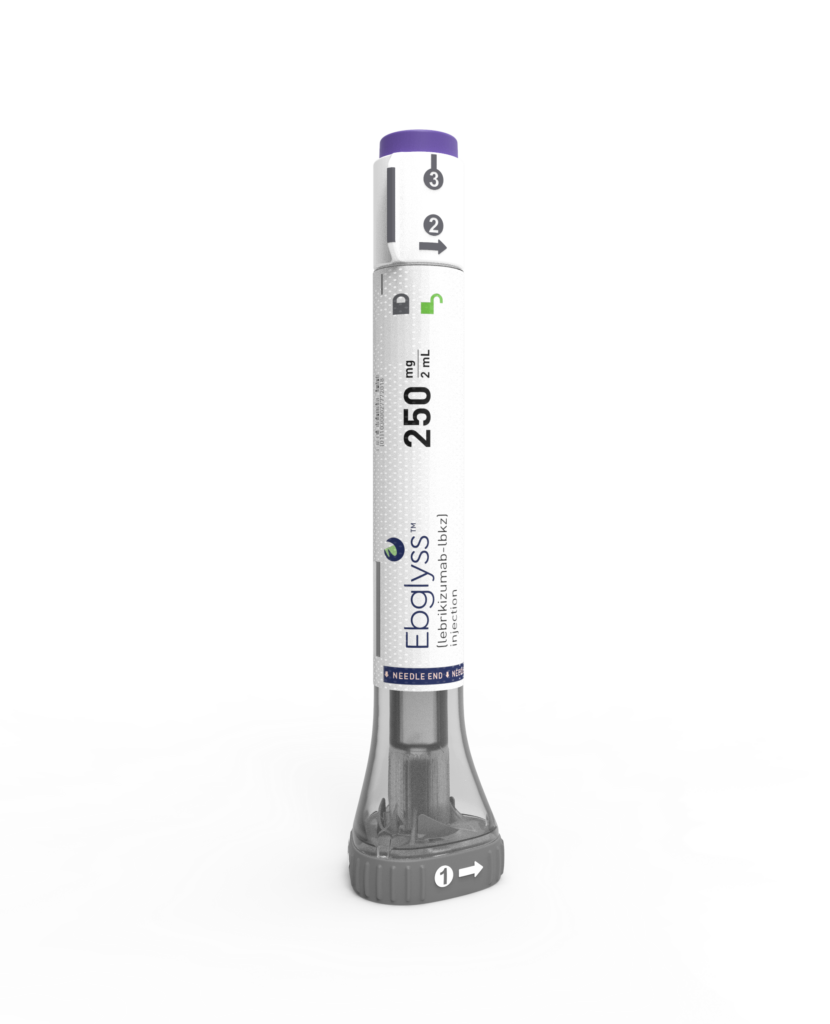The U.S. Food and Drug Administration (FDA) has approved lebrikizumab-lbkz (Ebglyss, Lilly), a targeted interleukin (IL)-13 inhibitor, for the treatment of adults and children 12 years of age and older who weigh at least 88 pounds (40kg) with moderate-to-severe atopic dermatitis (eczema) that is not well controlled despite treatment with topical prescription therapies.
Ebglyss 250 mg/2 mL injection can be used with or without topical corticosteroids and is dosed as a single monthly maintenance injection following the initial phase of treatment. The recommended initial starting dose of Ebglyss is 500 mg (two 250mg injections) at Week 0 and Week 2, followed by 250 mg every two weeks until Week 16 or later when adequate clinical response is achieved; after this, maintenance dosing is a single monthly injection (250mg every four weeks).
Ebglyss will be available in the United States in the coming weeks. Ebglyss was approved for use by the European Commission in 2023, as well as in Japan in January 2024 with additional markets expected later this year.
Experts React to Ebglyss Approval
Despite having more AD treatment options than ever before, there are still patients with unmet needs, says Peter A. Lio, MD, a Clinical Assistant Professor of Dermatology and Pediatrics at Northwestern University Feinberg School of Medicine and a partner at Medical Dermatology Associates of Chicago in Chicago, IL. “This new addition to our treatment toolbox for atopic dermatitis means that patients and clinicians will have another choice that is safe and effective,” he says. “Importantly, while it is similar to the existing agents dupilumab (Dupixent, Sanofi and Regeneron) and tralokinumab (Adbry, LEO Pharma), lebrikizumab binds IL-13 at a different site and has a very high affinity, meaning that it is possible that it will be a better fit for some patients. I am very excited about another excellent entry into the atopic dermatitis space.”
The approval was based on results from the ADvocate 1, ADvocate 2, and ADhere studies, which included more than 1,000 adults and children (aged 12 and older) with moderate-to-severe eczema who were unable to control their symptoms with topical prescription medicines. The primary endpoint for these studies was evaluated at 16 weeks and measured clear or almost clear skin (IGA 0,1).
In an average of two studies (ADvocate 1 and 2), 38% of people who took Ebglyss achieved clear or almost-clear skin at 16 weeks (versus 12% with placebo) and 10% saw these results as early as four weeks. Of the people who experienced clear or almost-clear skin at Week 16, 77% maintained those results at one year with once-monthly dosing. Fully 48% of responders who were switched from Ebglyss to placebo at Week 16 maintained these results at one year.
Similarly, in both studies, many people experienced itch relief with Ebglyss. On average, 43% of people who took Ebglyss felt itch relief at 16 weeks (compared to 12% who took placebo) and five percent felt relief as early as two weeks. Of the people who felt itch relief at Week 16, 85% still felt that relief at one year of treatment with monthly maintenance dosing. In addition, 66% of responders who were switched from Ebglyss to placebo at Week 16 maintained these results at one year.
“Eczema can affect people of all skin tones, ethnicities, genders and ages. Nearly 16.5 million adults in the U.S. have eczema, with 6.6 million experiencing moderate-to-severe symptoms like itchiness, dry and scaly skin, discoloration and rashes, which can lead to more scratching that may cause skin to crack and bleed,” adds Kristin Belleson, President and CEO of the National Eczema Association. “The approval of Ebglyss provides hope and promise for the eczema community and those still seeking lasting relief from disruptive symptoms.”
The most common side effects of Ebglyss include eye and eyelid inflammation, such as redness, swelling and itching; injection site reactions and shingles (herpes zoster). Ebglyss cannot be used in people allergic to lebrikizumab-lbkz or to any of the ingredients in Ebglyss. The maintenance period was generally consistent with the 16-week safety profile throughout multiple studies.
“People living with eczema have symptoms that can appear at the most inopportune times, creating unpredictability and impacting their everyday lives,” says Daniel Skovronsky, MD, PhD, Chief Scientific Officer and President of Lilly Research Laboratories, and president, Lilly Immunology. “Today’s approval allows people the opportunity to reimagine life with eczema as Ebglyss offers a targeted approach to reduce a main cause of eczema inflammation. Ebglyss provides long-lasting symptom relief with a convenient once-monthly maintenance dose.”
Lilly has exclusive rights for development and commercialization of Ebglyss in the U.S. and the rest of the world outside Europe. Lilly’s partner Almirall S.A. has licensed the rights to develop and commercialize Ebglyss for the treatment of dermatology indications, including eczema, in Europe.
Lilly is committed to setting new expectations for patients living with eczema and is working with insurers, health systems and providers to enable patient access to Ebglyss. Through Lilly Support Services for Ebglyss, Lilly will offer a patient support program including co-pay assistance for eligible, commercially insured patients. “I’m thrilled to know access is in line with Eli Lilly’s patient access program,” says Pansch.


